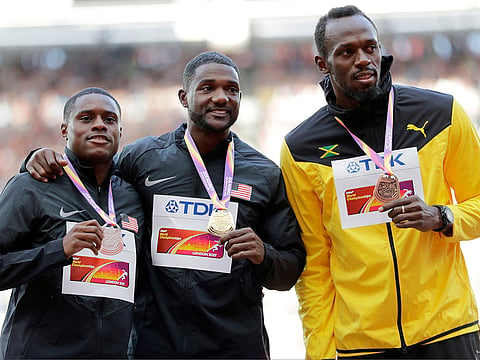Talking Point: A big jolt for Coleman in pursuit of Usain Bolt’s legacy
American 100m world champion’s track record of missing tests have gone against him

The provisional ban on Christian Coleman, currently the ‘fastest man’ on the planet, once again turns the needle of suspicion of drug abuse on athletics. What’s worse, it comes at a time when the sport is still grappling to find a successor to the retired sprint king Usain Bolt to market it better.
The Jamaican’s exit after the 2017 World Championships, after his ‘three-peat’ in three successive Olympics and complete domination of his events for close to a decade, had left a yawning gap for anyone to wear the superstar’s mantle. Justin Gatlin had stolen the thunder from Bolt in his last Worlds appearance in 2017, but then, the former’s integrity as an athlete could never be taken seriously after two bans.
It’s in this context that Coleman, now 24 years, had everything going for him to be the next big thing in 100 metres sprint after clocking 9.76 to win the most important race in the last Worlds at Doha. He was fortunate enough to participate there in the first place – having missed three ‘whereabouts’ tests during a period of 12 months before that - and should have been more careful about the drill this time.
This track record must have gone against him when the Athletics Integrity Unit (AIU) indicted him with a provisional ban – putting him at risk of a two-year ban that would rule him out of next year’s Tokyo Olympics. That would be a real tragedy, for the next Olympics ought to serve as the platform for the stocky sprinter to seal a claim to Bolt’s legacy.
Coleman, who was not found in his apartment by the team of UID testers in December last year, claimed that he was shopping for Christmas and was barely ‘’five minutes away’’ from home and the team made no effort to contact him. The anti-doping arm of World Athletics responded that they were not obliged to call the athlete over phone and according to their out-of-competition testing guidelines, athletes are accountable for missed tests if they are not at their specified location for the one-hour period they have stated.
There have been cases of athletes finding the ‘whereabouts’ rule as an impingement of their privacy, but then it’s like an occupational hazard that they have to live it. And if an athlete’s track record finds him to a serial offender, then the AIU has a good enough case to suspend his participation till the probe is complete.“After a close call last year for three whereabout failures or missed tests, for Coleman to allow this to happen again will lead people to believe either you’re doping or you don’t take seriously the anti-doping efforts of the sport. What reason do we have to believe otherwise?” tweeted Michael Johnson, Olympic gold medallist in the 200m and 400m and an eight-time world champion.
It has now become a case of Coleman’s words against that of UID, with the sprinter saying that he is ready to take a test for ‘’everyday’’ of his life to prove that he is clean.
For now, he has to just convince the authorities that he had no ulterior motive to miss out on the last one!
Sign up for the Daily Briefing
Get the latest news and updates straight to your inbox







